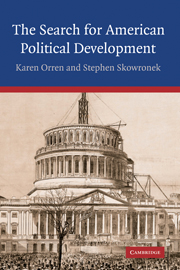5 - Political Development: The Issues
Published online by Cambridge University Press: 24 May 2010
Summary
If we could first know where we are and whither we are tending, we might better judge what to do and how to do it.
Abraham LincolnIf our definition of political development seems as comfortable as we hope, it will be because APD researchers discover they have been studying shifts in authority all along. Inclined as we are to quit while we are ahead, we feel an obligation to pick up again at the point where we bracketed larger issues of meaning and value in order to pursue a neutral definition of political development, one that could stand up empirically against the diverse historical materials engaged by scholarship in the field. The plan was not to leave these larger issues behind permanently; they were, and to many APD scholars still are, what makes political development worth thinking about. A clearer-cut definition anticipated a return, and now we are better equipped to look for answers. There is no expectation that profound matters of political philosophy will be settled by the idea of historical construction or our temporal matrix of intercurrent controls. But insofar as these profound matters contemplate, for instance, the prospects of different arrangements of authority being established and successfully sustained over time, we believe APD will have something of its own to contribute.
In this chapter we can provide only the briefest of previews of how the study of political development we describe might deliver on this promise, but we will try to do that much.
- Type
- Chapter
- Information
- The Search for American Political Development , pp. 172 - 202Publisher: Cambridge University PressPrint publication year: 2004



